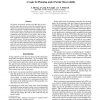227 search results - page 19 / 46 » Representing Incomplete Knowledge about Fuzzy Sets |
ECSQARU
1999
Springer
13 years 11 months ago
1999
Springer
Intelligent agents embedded in physical environments need ity to connect, or anchor, the symbols used to perform abstract reasoning to the physical entities which these symbols ref...
AAAI
2000
13 years 9 months ago
2000
We propose an epistemic dynamic logic EDL able to represent the interactions between action and knowledge that are fundamental to planning under partial observability. EDL enables...
ISMB
1993
13 years 8 months ago
1993
Thoughit has been possible in the past to learn to predict DNAhydration patterns from crystallographic data, there is ambiguity in the choice of training data (both in terms of th...
JASIS
2000
13 years 7 months ago
2000
s In data mining, we emphasize the need for learning from huge, incomplete and imperfect data sets (Fayyad et al. 1996, Frawley et al. 1991, Piatetsky-Shapiro and Frawley, 1991). T...
RSCTC
1998
Springer
13 years 11 months ago
1998
Springer
Abstract. Institutional databases can be instrumental in understanding a business process, but additional data may broaden the empirical perspective on the investigated process. We...

